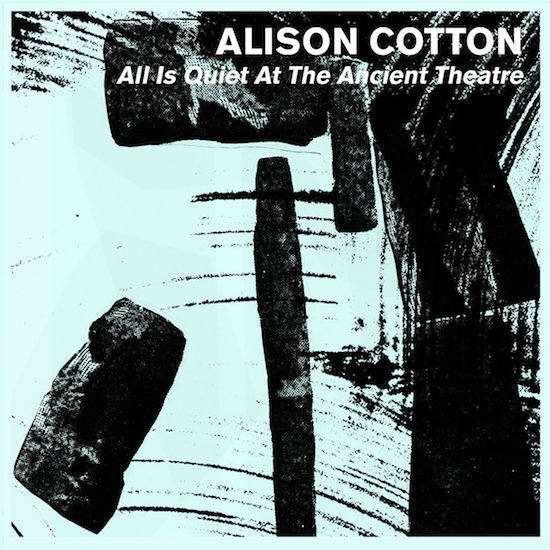Alison Cotton is part of several projects loosely located within the psychedelic folk revival, including Trimdon Grange Explosion and United Bible Studies, but All Is Quiet At The Ancient Theatre is her first solo recording, released on cassette and download by Bloxham Tapes. It has allowed her to explore a more improvisatory side, expressed through her sonorous viola playing. The title foregrounds a response to place, which lies at the heart of the five pieces on this absorbing album. The opening, title track is built around a repeated, six-note viola phrase that seems to echo around an amphitheatre of stone. Heat haze rises from empty seats, but the music is playing from a time when the theatre was packed. A drone builds and the falling phrase emerges haltingly, as though calling out for the first time in centuries. As the viola sings, a chorus of soft, layered voices, percussion and recorder swells in the background and soon a cast is on stage, performing a forgotten ritual. If any piece of music can awaken a lost time, this is surely it.
It is a confident and enthralling opener and, now the sleepers have awakened, they give us four more tracks laden with ghostly intent. ‘The Last Sense To Leave Us’ is an unnerving piece built around wobbly strings, drone and wordless vocals. ‘36 Dramatic Situations’ is more elegiac, and Cotton’s viola gnaws away at low, beautiful notes while sounding very much like Laura Cannell, which is never a bad thing. Then comes ‘The Bells of St. Agnes’, a song so assured that is a genuine surprise to find that it is written by Cotton herself, like all the tracks, and is not drawn from the traditional repertoire. For the first time her voice emerges from the background, the transmissions from the past becoming clearer all the time. From a Gregorian chant a haunted melody breaks free of such sheer gorgeousness that Pentangle would be fighting Vashti Bunyan for the rights. It is worth the very modest price of the album on its own.
The final track, ‘A Tragedy In The Tithe Barn’, echoes the melody from the previous track, filtering it through a high, pure viola line before a low drum roll ushers the musicians from the stage, fading away before there is time for curtain call. Alison Cotton’s album is a highly memorable suite evoking other times and places with a deftness and a lightness of touch. She is an excellent and restrained songwriter, confidently combining instrumental and vocal music to create a recording that delivers much and promises more to come.


